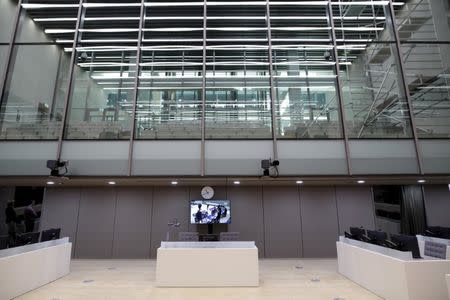Stay and fix the ICC, African Union hopeful urges peers
By Ed Cropley JOHANNESBURG (Reuters) - African states unhappy with the International Criminal Court(ICC) should work to reform it from within rather than pulling out, Botswanan foreign minister Pelomoni Venson-Moitoi, a candidate to become the next African Union (AU) chief, said. With the AU increasingly divided over the ICC, South Africa announced last week that it planned to quit, but Venson-Moitoi said she believed an African war crimes court could be beefed up to work alongside its Hague-based counterpart. Although South Africa argued that the ICC's Rome Statutes were at odds with its laws granting leaders diplomatic immunity, other African countries see the tribunal purely as an instrument of colonial justice that unfairly targets the continent. "I don't see why we should be pulling out. The good thing is that a few more members now, within the AU, agree that pulling out is not the solution. We should be working towards fixing," she told Reuters in an interview, without elaborating. After she spoke, Gambia said late on Tuesday it too was withdrawing from the ICC, calling it "an International Caucasian Court for the persecution and humiliation of people of colour, especially Africans". Venson-Moitoi's main rival for the AU chair is Kenyan foreign minister Amina Mohamed. Kenya has also been leaning towards ICC withdrawal since charges were brought against President Uhuru Kenyatta and his deputy, William Ruto, over links to post-election bloodshed in 2008 in which at least 1,200 people were killed. The cases against both collapsed for lack of evidence. The AU is likely to choose its successor to South Africa's Nkosazana Dlamini-Zuma at its annual summit in January. Should she prevail, Venson-Moitoi said she would try to get the Tanzanian-based African Court on Human and Peoples' Rights, which unlike the ICC currently grants immunity to sitting leaders, to "work together" with the Hague tribunal. CLEAN ELECTIONS The outspoken 65-year-old also advocated more robust and rigorous AU monitoring of regional elections as an antidote to the controversy, disputes and violence that habitually follow polls in many African countries. "I'm quite aware of what it takes to run a fair election, to avoid abuse, to avoid conflict," she said. "You must manage the whole process so that when the number comes out at the end, it confirms a clean process." In its 50 years since independence, Botswana has built a reputation as a stable, peaceful and prosperous democracy with a no-nonsense political leadership. Last month, President Ian Khama caused fury in neighbouring Zimbabwe when he told Reuters that his 92-year-old counterpart, Robert Mugabe, was too old to remain in office. Venson-Moitoi reaffirmed the sovereignty of member states but said she would be demanding answers personally from leaders whose internal problems spilled into neighbouring states, as has happened this year with refugees fleeing violence in Burundi. "I'm a hands-on person. I would get on the next plane and go there. That's how I work. If it means going there and talking to the refugees, I'd go there and talk to them myself," she said. Such comments are likely to ruffle feathers in the AU, where interfering in a member nation's internal affairs remains a big taboo, but Venson-Moitoi said a dose of honesty and plain-speaking would do her, and the continent, no harm. "That's what Africa needs. There is nothing wrong with being outspoken - if you are outspoken for the right reasons. If you are outspoken in the interests of Africa, I don't see anything wrong with that." (editing by David Stamp)

 Yahoo News
Yahoo News 

